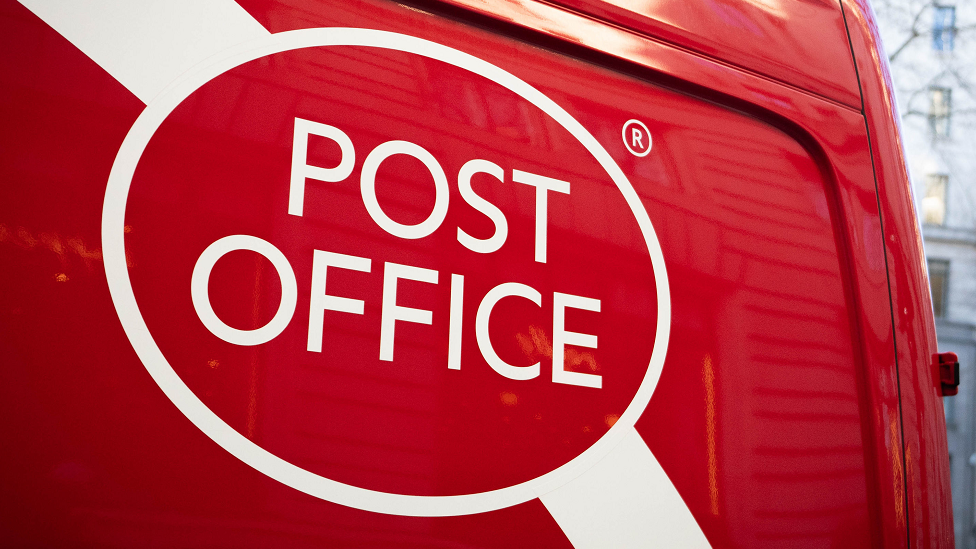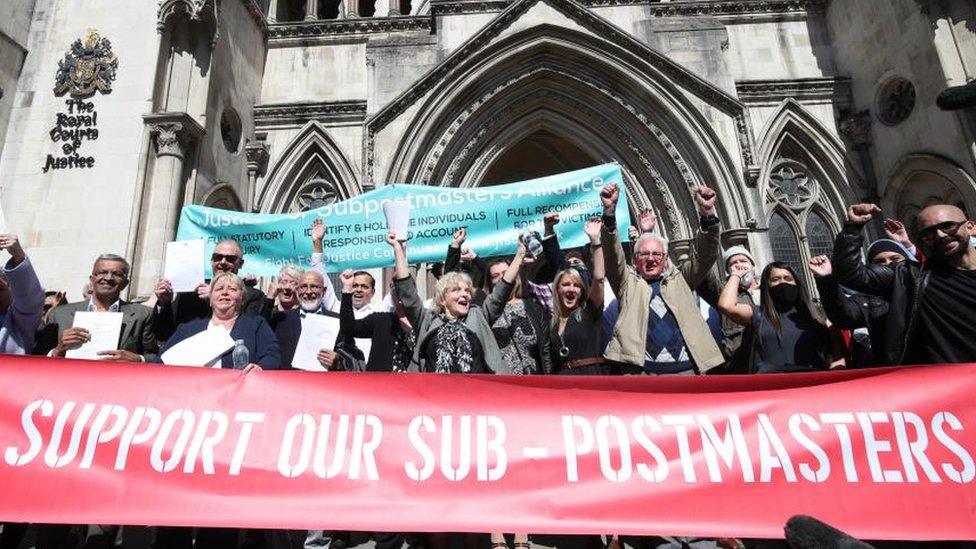Post Office may face £100m tax bill over victim payouts - experts
- Published

The Post Office may have underpaid more than £100m in tax by deducting payments to victims of the Horizon scandal from its profits, say tax experts.
Claiming tax relief in this way could count as a breach of the law and could mean it is at risk of insolvency, said Dan Neidle, of Tax Policy Associates.
The company also may have overpaid senior executives, he says.
The Post Office said its financial information was "appropriate and accurate".
It has been paying out to sub-postmasters who have had their theft convictions quashed.
Repaying the alleged shortfall to HMRC could render the Post Office technically insolvent and would involve the government stepping in to financially support it.
However as the Post Office is owned by the government, exacting financial penalties is tantamount to the government fining itself and no-one is suggesting the Post Office will cease to function.
Corporation tax is paid to the government by UK companies and foreign companies with UK offices.
It is charged on their profits - the amount of money companies make, minus their costs such as staff and raw materials.
While businesses can claim corporate tax deductions for legitimate business expenses, costs related to penalties or fines are not generally tax deductible.
In this instance, the Post Office allegedly deducted the payments made to victims of the Horizon IT scandal from their revenue, resulting in a lower profit and therefore a lower tax bill.
Mr Neidle said: "The non-deductibility of compensation for unlawful acts is a well-known point."
Heather Self from accounting and advisory firm Blick Rothenberg agreed.
"The payments of compensation by the Post Office are almost certainly not deductible for corporation tax purposes, in my view. Not only is it difficult to argue that they were incurred for trading purposes, there is also a general rule of public policy that fines - or payments in the nature of fines - are not deductible."
The BBC understands that HMRC is investigating the way that the Post Office has accounted for the compensation payments and provisions.
In its most recently published financial accounts, the risk of a significant adverse tax ruling is acknowledged.
Notes to the accounts include the following: "As at the balance sheet date the company was engaged in discussions with HMRC regarding potential taxation liabilities that could arise in relation to past events but for which no liability has currently been recognised". It continues "the Directors recognise that an adverse outcome could be material".
Mr Neidle estimates that deducting postmaster compensation from the Post Office's trading profit would mean that it underpaid more than £100m in corporation tax.
The Post Office does not currently have enough money to pay that bill and would therefore, Mr Neidle argues, be technically insolvent.
A spokesman said that HMRC could not comment on specific business or individuals but said: "We collect the tax due under the law, creating a level playing field for everyone and funding public services." The Post Office said its financial information was "appropriate and accurate" and it was in discussions with HMRC and the Department for Business and Trade, which oversees the state-owned company.
Executive pay
While the Post Office appears to have deducted compensation provisions from their taxable profits, it apparently ignored them when it came to calculating executive pay.
The largest determinant of bosses' pay is a measure the Post Office calls "trading profit", which excludes the money set aside to compensate scandal victims, thereby increasing the pay of executives.
Chief executive Nick Read received a salary of £436,000 in the year ended 2022, plus a bonus of £137,000, as the Post Office was deemed to have recorded an above target trading profit if compensation provisions were ignored.
Mr Neidle said: "Bonuses have been paid to the executive team based on an apparent level of profitability which does not exist. If a public company missed an obvious tax point that made the business insolvent the shareholders would be demanding the CFO and CEOs head on a platter".


Were you a sub-postmaster or post-mistress? Tell us your story by emailing: haveyoursay@bbc.co.uk, external.
Please include a contact number if you are willing to speak to a BBC journalist. You can also get in touch in the following ways:
WhatsApp: +44 7756 165803, external
Tweet: @BBC_HaveYourSay, external
Or fill out the form below
Please read our terms & conditions and privacy policy
If you are reading this page and can't see the form you will need to visit the mobile version of the BBC website to submit your question or comment or you can email us at HaveYourSay@bbc.co.uk, external. Please include your name, age and location with any submission.

Related topics
- Published10 January 2024
